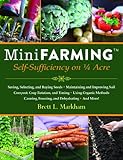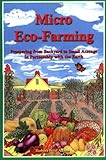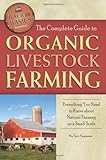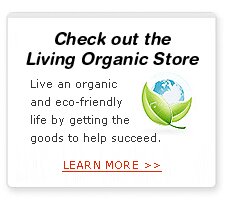Living Organic Online Store
Organic Farming Books
Organic Marin: Recipes from Land to Table
"Now more than ever, we need to make decisions about cooking and eating that support the kind of agriculture that takes care of the land we hold in trust for future generations. This beautiful book, full of recipes for delicious, seasonal meals, is a tribute to the Marin County farmers, artisans, and cooks who uphold that stewardship and provid for our future." --Alice Waters, Chez Panisse Restaurant "Organic Marin" gives you a taste of what has become one of America's most vibrant local food scenes; indeed, this beautiful book is the next best thing to eating there." --Michael Pollan, author of "The Omnivore's Dilemma and In Defense of Food" "Every society is a direct reflection of the status of its soil . . . Everything comes from soil. We are nothing without it." --Helge Hellberg, executive director of Marin Organic "Organic Marin" is more than a regional cookbook. It also represents an organic movement reverberating around the globe, demanding a more thoughtful, less wasteful approach to life. The connection between field and farmer, land and table, and food and family translates to the passionate belief that food fosters community. And nowhere is this connection more apparent than in Marin County, California, the birthplace and standard-bearer of American organic farming. In "Organic Marin," 16 of America's most esteemed organic farms share their stories and philosophies alongside 50 mouthwatering organic recipes organized by season and contributed by 25 of the San Francisco Bay Area's most popular organic restaurants. With recipes for Heirloom Tomato Flat Bread, Seared Ahi Tuna with Asian Slaw, Chicken Fra Diavolo with Fennel and Dandelion Salad, Double ChocolateBread Pudding, and much more, anyone can create the delicious dishes featured in this beautiful and inspiring organic cookbook. Proceeds of "Organic Marin" support Marin Organic's school lunch program, which serves 12,000 lunches a week with food grown in Marin County.
From Seed to Table: A Practical Guide to Eating and Growing Green
Eating locally grown seasonal food is the solution to so many of the social and environmental problems raised by modern intensive food production methods. In From Seed to Table, organic gardener Janette Haase offers a month-by-month guide to growing a significant amount of food in a home garden. From the earliest salad leaves to the autumn's sweetest root vegetables, this book will show anyone with a small plot of earth and willing hands how to eat a healthier, more environmentally responsible diet--one with a smaller impact on both the environment and household food bills. The book's introductory chapter explains the importance of eating locally and seasonally and offers some practical considerations before beginning a garden of one's own. The rest of the book is divided into chapters covering each months. Haase takes the home gardener through the tasks of the gardening year, giving clear and helpful instructions for the work to be done at each time, from planning and planting to harvesting and storage. She also offers delicious seasonal recipes and menu ideas. From Seed to Table concludes with a thoughtful essay on food-related environmental issues, from greenhouse gasses to the genetic modification of seeds. Janette Haase was born in Montreal and was raised there and in Newfoundland. She holds a degree in geology from Queen's University. Haase started farming on fifty acres near Kingston, Ontario, and ran a large organic market garden. In 1998, as a single parent with a tiny front garden and no backyard in a village near Kingston, Haase planted vegetables and realized she could feed her family with what she could grow in a very small space.
The Farmstead Creamery Advisor: The Complete Guide to Building and Running a Small, Farm-Based Cheese Business
There has never been a better time to be making and selling great cheese. People worldwide are consuming more high-quality, handmade cheese than ever before. The number of artisan cheesemakers has doubled in recent years, and many of the industryas newcomers are afarmsteada producers- those who work only with the milk of their own animals. Today, more than ever before, the people who choose to become farmer-cheesemakers need access to the knowledge of established cheese artisans who can help them build their dream.Few career choices lead to such extremes of labor, emotion, and monetary challenge. In "The Farmstead Creamery Advisor," respected cheesemaker, instructor, and speaker Gianaclis Caldwell walks would-be producers through the many, and often confusing, steps and decisions they will face when considering a career in this burgeoning cottage industry. This book fills the gap that exists between the pasture and cheese plate. It goes far beyond issues of caring for livestock and basic cheesemaking, explaining business issues such as: Analyzing your suitability for the careerDesigning and building the cheese facilitySizing up the marketNegotiating day-to-day obstaclesEnsuring maximum safety and efficiencyDrawing from her own and other cheesemakersa experiences, Caldwell brings to life the story of creating a successful cheesemaking business in a practical, organized manner. Absolutely essential for anyone interested in becoming a licensed artisan cheesemaker, "The Farmstead Creamery Advisor" will also appeal to the many small and hobby-farm owners who already have milking animals and who wish to improve their home dairy practices and facilities.
Organic Dairy Farming: A Resource for Farmers
Written for the transitioning and new organic farmer, Organic Dairy Farming brings together for the first time in a single volume the information to explain everything from organic soil management, calf care and mastitis control to the certification process and marketing for the organic premium. Combining up-to-date advice from 20 experts in a variety of fields, it presents organic concepts and practices in a readable form. The book includes farmer interviews demonstrating how they have successfully applied organic practices on their own farms. Over sixty illustrations, glossary, list of resources and complete index make the book very useable. An essential tool for both the farmer and the agricultural professional.
Food for the Future
Big ideas made simple -- six books in an incredible new series that explains important scientific ideas more clearly than ever before. A safe supply of healthy food is a necessity for all societies, but seems harder than ever to achieve. This book examines modern farming methods, problems such as BSE, and potential solutions -- from organic to genetically modified foods. This stimulating new series uses an innovative mix of graphics, artwork, and photographs to explain and illuminate the most important scientific topics of the day. Unique in popular science guides, Essential Science uses bright, full-color images to make traditionally "difficult" subjects more accessible. Each title focuses on a scientific or technological topic that is currently provoking debate and is likely to have a widespread impact on our lives. Lively, readable text from top science writers ensures all readers -- from 14+ schoolchildren to academics -- gain a full understanding of the facts and related issues. Under the direction of renowned science writer John Gribbin, expert authors describe, in lively, jargon-free text, the principles and discoveries behind each subject, summarize what is currently known, and predict future issues and trends.
Backyard Market Gardening
Discover how easy and profitable it is to grow ans sell vegetables, fruits, flowers, herbs and small livestock from your own backyard market garden. Learn how others grow and sell: o 14,000 pounds of food, on less than one-eighth acre - Ohio o $150,000 from one-half acre, to fancy restaurants - California o $40,000 from one acre of oriental raised beds - Oregon o $36,000 from 3/4 acre, to city farmers' markets - Massachusetts Learn how you can: . Earn top dollar, with minimum effort and maximum profits. . Grow high-value crops in small spaces, efficiently and quickly. . Improve your garden soil for super yields and superb flavor. . Create markets that are profitable, reliable, fun and sustainable. . Improve your garden soil for super yields and superb flavor. . Buy or build tools that speed your work and increase profits. . Enjoy a guaranteed salary from community supported agriculture or a membership garden. Find your market niche in: membership gardening, community supported agriculture, farmers' markets, card table in your front yard, farm stands, clientele membership clubs, producers cooperatives, restaurants, caterers, institutions, pick your own and even growing specialty crops for your neighbor's salsa recipe. "BACKYARD MARKET GARDENING is the book that shows you how to do what you can with what you have where you are." - George DeVault, Organic Gardening Magazine. "Market gardening as described by Andy Lee is very rewarding to the soul, the soil, the environment, and the flow of capital."- Jim Hightower, Austin, Texas
Profitable Organic Farming
The demand for food produced from sustainable and organic farm enterprises continues to grow worldwide, with demand exceeding supply for many items. This second edition of an extremely well received and successful book covers every aspect of an organic farm enterprise that can have an influence on profitability. As such the book is an essential purchase for all those involved in organic and sustainable farming. Topics covered in this second edition of "Profitable Organic Farming" include grassland productivity, production systems for dairy, beef, sheep, pig, poultry and arable farms, farm size and enterprise combinations, organic standards, financial management, marketing, success factors and progress by organic farmers. The book concludes with a new chapter covering potential future scenarios for organic farming. Drawing on new information available in the area and including case studies from successful organic farm businesses, the author Jon Newton has written a book that is of great commercial use to a wide range of workers including organic farm managers and those wishing to commence organic farming operations. The book is also of great use and interest to agricultural scientists and students and those working in government and regional agricultural advisory services worldwide. Libraries in research establishments, universities and colleges where agricultural sciences are studied and taught should have several copies of this important and useful book on their shelves. Review of the first edition 'It is an essential volume for any commercial organic farmers or budding organic farmers bookshelf. It will no doubt also be a very popular read and provide much food for thought amongst many agricultural students': "New Farmer & Grower." Jon Newton is an agricultural consultant specialising in organic and sustainable agriculture based in North Wales, UK.
Mini Farming: Self-Sufficiency on 1/4 Acre
Start a mini farm on a quarter acre or less, provide 85 percent of the food for a family of four and earn an income. Mini Farming describes a holistic approach to small-area farming that will show you how to produce 85 percent of an average family’s food on just a quarter acre—and earn $10,000 in cash annually while spending less than half the time that an ordinary job would require. Even if you have never been a farmer or a gardener, this book covers everything you need to know to get started: buying and saving seeds, starting seedlings, establishing raised beds, soil fertility practices, composting, dealing with pest and disease problems, crop rotation, farm planning, and much more. Because self-sufficiency is the objective, subjects such as raising backyard chickens and home canning are also covered along with numerous methods for keeping costs down and production high. Materials, tools, and techniques are detailed with photographs, tables, diagrams, and illustrations.
Micro Eco-Farming: Prospering from Backyard to Small Acreage In Partnership with the Earth
There is a quiet revolution happening in our time: the emergence of microfarms on tiny acreages that achieve astounding yields of organic produce and provide a better-tasting alternative to the products of big agri-business. Micro eco-farmers across the nation are profiting from small acreages to small-town backyards. Their livelihoods restore the planet while creating an abundance of healthy products produced in very small spaces. Micro Eco-Farming details how the new micro eco-farmers succeed on mini-farms of from one to five acres, how they start with nothing, what traits they share, and what secrets they know. In addition to presenting close-ups of those who are actually earning a full-time income for at least one adult, Micro Eco-Farming also provides a treasury of what you can grow, what farming methods you can use, and how the farmers reach their markets in surprisingly creative, new ways. The book outlines the emerging new sustainable production methods and distills the methods that have increased production on small ground from double to up to 40 times that of conventional growing. Hundreds of real-life examples are presented with ideas, resources and methods for all who aspire to create their own micro eco-farm: from backyard gourmet restaurant gardens, homegrown organic spa products, u-gather nut groves, front-yard cut-flower stands, heritage rose farms, children's and holiday farms, urban greenhouses, farm and cottage industry partnerships, herbs and flowers for healing, connoisseur apple orchards, ethnic personal chef gardens, old-fashioned farm festivals, native and wild edible farms, to mail-order farm crafts and more. Finally, although the new micro eco-farmers usually achieve their dreams of economic independence, there is also the understanding as well that success includes something greater than financial profits. Micro Eco-Farming invites you share the eco-farmers' dream of prosperity and fullfillment, in partnership with the earth, and it gives you the inspiration and practical tools to live the dream.
The Complete Guide to Organic Livestock Farming: Everything You Need to Know about Natural Farming on a Small Scale (Back-To-Basics Farming)
Small scale farming has grown greatly in popularity during the last two decades, with a greater turn in public awareness toward locally grown, organic, grass fed products that have not been modified, chemically altered, or poorly fed. For that reason, those looking to start a small scale farm and raise livestock have a greater chance than ever before to take advantage of the new market for small scale goods. This book will show any potential small scale farmer how to start raising their livestock and marketing it to the organic, natural lifestyle community that so fervently seeks out these products. You will learn how to start the basic outline for your new small farm, including which livestock to raise, how to build their pens and habitat, and what you will be feeding them to maintain a healthy, organic farm. You will learn the basics of animal husbandry, from genetics and breeding to feeding, building locations, and proper health and reproduction care. You will learn how to find yourself in the right niche for selling your products and what legalities you must see to as well as the butchering and processing phase Hundreds of hours of in-depth interviews have been conducted for this book with top experts in farm management to provide you with details about farm planning, financial planning, and proper livestock planning. A complete appendix will detail the various breeds and needs of cattle, chickens, goats, horses, pigs, and sheep to help you select the right livestock for your farm. In addition, you will learn the basic composition of most feeds, different grasses and legumes you can use, and find a plethora of outside resources to utilize. For anyone with dreams of a small farm and raising livestock in their future, this is a book for you.
The Winter Harvest Handbook: Year-Round Vegetable Production Using Deep-Organic Techniques and Unheated Greenhouses
Choosing locally grown organic food is a sustainable living trend thatas taken hold throughout North America. Celebrated farming expert Eliot Coleman helped start this movement with "The New Organic Grower" published 20 years ago. He continues to lead the way, pushing the limits of the harvest season while working his world-renowned organic farm in Harborside, Maine.Now, with his long-awaited new book, "The Winter Harvest Handbook," anyone can have access to his hard-won experience. Gardeners and farmers can use the innovative, highly successful methods Coleman describes in this comprehensive handbook to raise crops throughout the coldest of winters.Building on the techniques that hundreds of thousands of farmers and gardeners adopted from "The New Organic Grower" and "Four-Season Harvest," this new book focuses on growing produce of unparalleled freshness and quality in customized unheated or, in some cases, minimally heated, movable plastic greenhouses.Coleman offers clear, concise details on greenhouse construction and maintenance, planting schedules, crop management, harvesting practices, and even marketing methods in this complete, meticulous, and illustrated guide. Readers have access to all the techniques that have proven to produce higher-quality crops on Colemanas own farm.His painstaking research and experimentation with more than 30 different crops will be valuable to small farmers, homesteaders, and experienced home gardeners who seek to expand their production seasons.A passionate advocate for the revival of small-scale sustainable farming, Coleman provides a practical model for supplying fresh, locally grown produce during the winter season, even in climates where conventional wisdom says it ajust canat be done.a
The Organic Gardener's Handbook
In a handy, illustrated format, this reference book studies all aspects of organic farming, from the basics of climate, geology, and soils, to an explanation of plants and their orders. The guide also explores planning and planting methods, including strip cropping and crop rotation; protection for a variety of vegetables and edible plants; companion planting and biological control; plant pests, barriers, and deterrents; and weed management. Particular attention is paid to improvements to the soil, fertilizers, minerals, compost, and manures. Complete with a list of tasks and monthly reminders, an extensive glossary, and useful contacts, this resource provides reputable advice for all gardening aficionados.








